The Natural Home Care for Pet Allergies
 "Has your veterinarian diagnosed allergies and sentenced your beloved pet companion to years of steroid therapy?
Each day I help pets with allergies get off of steroids and help them live longer,
itch-free lives. Get ready to learn how to improve your pet's life the holistic way!" -Dr Shawn Messonnier DVM
"Has your veterinarian diagnosed allergies and sentenced your beloved pet companion to years of steroid therapy?
Each day I help pets with allergies get off of steroids and help them live longer,
itch-free lives. Get ready to learn how to improve your pet's life the holistic way!" -Dr Shawn Messonnier DVM
People that have pets with skin problems, allergies, stomach
problems and behavioral problems spend hundreds of dollars at the
vet on antibiotics, steroids, tranquilizers, and other medication. These medications take a
serious toll on the internal organs and defense systems of our pets.
It becomes a never-ending circle of medication and sickness. Skin
problems and allergies are often symptoms of nutritional deficiency
and toxic overload. A deficiency in key nutrients can also weaken the organism and predispose animals to
suffer from symptoms of dermatitis or allergies. Pet with allergies can be, and often are, unrecognized deficiency diseases. Recognizing
nutritional deficiencies will save you a great deal of frustration
and allow you to make the necessary adjustments in your dog and cat's diet.
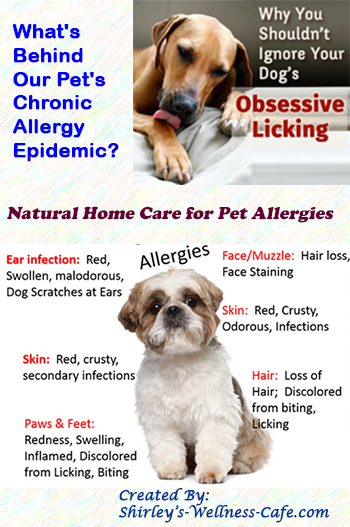 Dr. Blanco DVM and other holistic veterinarians believe that when dogs, cats and
other animals experience excessive itching, biting and licking, the real culprit may be symptoms triggered by
reaction from over-vaccination, as well as a result of environmental toxins and medications.
Dr. Blanco DVM and other holistic veterinarians believe that when dogs, cats and
other animals experience excessive itching, biting and licking, the real culprit may be symptoms triggered by
reaction from over-vaccination, as well as a result of environmental toxins and medications.
Dr. Cynthia Harcourt, DVM - "Allergies represent more
than a local inflammation of the skin. They reflect a
constitutional state. From a holistic standpoint, the approach to
treatment recognizes the deeper constitutional state and restores
order and balance to the whole animal.
inside out, ointments, shampoos, sprays and dips can only provide
temporary relief and although are beneficial to use for improving
your pet's quality of life during a flare up, long-term treatment
must focus on balancing your pet's defense system."
Steroids (also called prednisone, cortisone or
the nondescript 'allergy shot') are the least optimal
treatment choice, as they work by suppressing your pet's immune system. Steroids actually turn the
defense system off, which appears to improves the symptoms
remarkably fast, but triggers long lasting side effects and doesn't address the root
issue of why your pet's defense system is over-reacting in the first place.
Dr. Cynthia Harcourt, DVM - "I
believe that adverse reactions from pet vaccinations, especially the rabies vaccines, are
contributing to a lot of the "allergic" skin problems seen today,
leading to a problem known as vaccinosis, which is characterized by
itchy, dark, thickened skin; especially over the abdomen and under
the legs.
Dr. Anna Maria Gardner -
"...Skin problems are the tip of the iceberg, and represent a
body that is overstressed by the accumulation of years of toxins,
vaccinations and poor diet. The problem is really an defense system
that just cannot cope with the environment we are living in.
Identify and, if possible, avoid allergens to give rapid relief.
Look at the animal's environment when considering allergens
(pollens, plastics, nylon, wool, etc.), toxins (pesticides, chemicals, etc.), irritants
and more. Use the curative power of nature. By eliminating causes and supporting organ and immune
function with good diet, detoxification, internal cleansing, and
supplements, the body will heal itself.
Prevent the condition. An ounce of prevention is worth a pound of cure.
It is seen in both dogs and cats, but is more obvious in
the dog. While we have to continue to vaccinate our dogs and cats
against rabies for public health reasons, there are things we can
do to at least minimize the effects of the vaccine on the body.
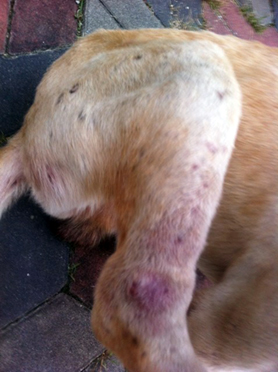
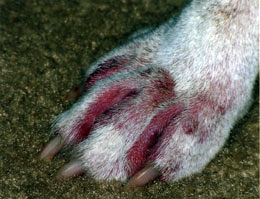 A good general approach to skin problems is therefore to
consider them the results of a body loaded with toxins, and
anything that can be done to reduce this load will help the animal.
A good general approach to skin problems is therefore to
consider them the results of a body loaded with toxins, and
anything that can be done to reduce this load will help the animal.
So a good natural food diet is often the single most useful thing that
can be done, as discussed in an earlier edition of this magazine.
This will often make a big difference and is well worth trying
before resorting to steroids, or other drugs.
The use of a good filtered water source or high quality spring water can also help,
as can purifying the air in the home your pet lives in. Replace the
use of dips, sprays and all strong chemicals to
control fleas and ticks naturally. It is a
fact that when your pet becomes healthier, and on a better diet and
preventative health regime, they will be better able to repel the
fleas and not become totally infested. If we can strengthen the
immune system, then we can help the body to heal itself, not
suppress it further with steroids and strong drugs.

Pet Allergies: Remedies for an Epidemic
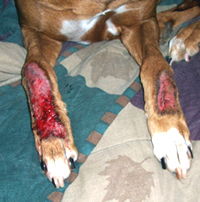 In his best selling book, "
Dr. Alfred Plechner, DVM, paints a dismal picture for the future of our pets. Animals
are being programmed for disaster, for extinction. Many of them are
biochemical cripples with chronic kidney disease and with defective adrenal glands unable to
manufacture adequate cortisol, a hormone vital for health and
resistance to disease." Allergies can be, and often are,
unrecognized deficiency diseases. Recognizing nutritional
deficiencies will save you a great deal of frustration and allow
you to make the necessary adjustments in your dog's diet."
In his best selling book, "
Dr. Alfred Plechner, DVM, paints a dismal picture for the future of our pets. Animals
are being programmed for disaster, for extinction. Many of them are
biochemical cripples with chronic kidney disease and with defective adrenal glands unable to
manufacture adequate cortisol, a hormone vital for health and
resistance to disease." Allergies can be, and often are,
unrecognized deficiency diseases. Recognizing nutritional
deficiencies will save you a great deal of frustration and allow
you to make the necessary adjustments in your dog's diet."
Dr. Jeffrey Levy, DVM - "Have you ever wondered why some
dogs and cats have severe flea problems, while others are hardly
bothered by the little pests? Fleas can be viewed as an indicator
of an animal's general health. Parasites in general, and fleas in
particular, are most attracted to the weak, unhealthy, or very
young animal whose immune system is not
functioning well. The long-term solution to a flea problem is to
reduce your pet's susceptibility to fleas by improving his/her health."
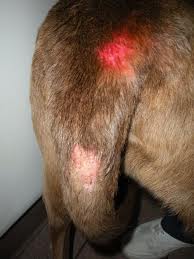 Dr. Autumn Drouin, DVM, ND "Do no harm. The animal's
condition must not be made worse in the long run to alleviate
symptoms. Vaccines and flea and heart worm prevention can add to the
body's toxic load, which can lead to further immune system
compromise. Identify and eliminate the cause/s and obstacles to
cure. First, rule out skin parasites such as mites, fleas, ringworm (a fungal
infection), and Leishmaniasis (for dogs from warmer climates).
Dr. Autumn Drouin, DVM, ND "Do no harm. The animal's
condition must not be made worse in the long run to alleviate
symptoms. Vaccines and flea and heart worm prevention can add to the
body's toxic load, which can lead to further immune system
compromise. Identify and eliminate the cause/s and obstacles to
cure. First, rule out skin parasites such as mites, fleas, ringworm (a fungal
infection), and Leishmaniasis (for dogs from warmer climates).
1. Smell like a corn chip
2. Become insanely itchy, which sends you back to the vet for more
steroids
Do you see the crazy cycle? The image does a great job of
explaining it further.
As an aside, keep in mind that healthy pets do not smell bad.
Yeast exudes a musty smell, and if your pet smells this way he may
have a problem with yeast overgrowth. Many people assume their pets
should smell this way, but in reality healthy pets should only be
bathed with they're dirty -- not because they're smelly. Bathing
smelly pets in oatmeal (a grain) shampoo often adds fuel to the
fire, requiring the pet to be re-bathed multiple times a week in
order for the owners to tolerate the pet's odor.
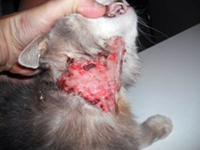 Holistic vets use a natural immune modulator before and after vaccination to help protect the integrity of the immune system.
They also give a dose of the homeopathy remedy Lyssin 30
C, which is made from the saliva of a rabid dog, using the premise
that like treats like, which is the basis of homeopathy.
Holistic vets use a natural immune modulator before and after vaccination to help protect the integrity of the immune system.
They also give a dose of the homeopathy remedy Lyssin 30
C, which is made from the saliva of a rabid dog, using the premise
that like treats like, which is the basis of homeopathy.
This should be given as soon as possible after the rabies shot to try
and prevent the development of any adverse reactions to the vaccine. Once the
skin problems are evident, it is worth trying a dose of Thuja 6 C
every day to also remove the effects of the vaccine from the body,
as this is very often needed before other homeopathic treatment can
be started. Other homeopathic remedies may be needed, as prescribed
by a licensed veterinarian, and are very often helpful in cases of
chronic allergies, and can replace the use of steroids in many
cases.
Nutrition is the Optimal Solution
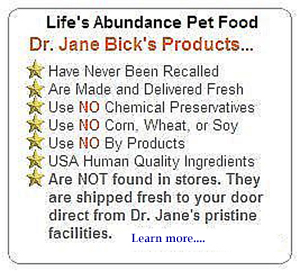 The foods you feed your pet will eventually heal or
harm. Feeding your pets a diet of nutritious, healing, and non-allergenic pet foods allows
their immune systems to rest. Balance
your pet's immune system by offering natural, biologically
appropriate wholesome foods is necessary to begin the road to
recovery. Also remember that the more variety you include in your
pet's diet, the less likely your pet will be to react to the same
monotonous foods. Nutritional variety is not only the spice of
life, it's critical for a balanced and healthy immune response --
and for keeping your pet allergy-free.
The foods you feed your pet will eventually heal or
harm. Feeding your pets a diet of nutritious, healing, and non-allergenic pet foods allows
their immune systems to rest. Balance
your pet's immune system by offering natural, biologically
appropriate wholesome foods is necessary to begin the road to
recovery. Also remember that the more variety you include in your
pet's diet, the less likely your pet will be to react to the same
monotonous foods. Nutritional variety is not only the spice of
life, it's critical for a balanced and healthy immune response --
and for keeping your pet allergy-free.
The Immune System Protects from Allergies
Vitamins, minerals and antioxidants are among the most commonly used supplements to
help pets with a variety of medical disorders. Antioxidants are
specific vitamins (such as vitamin C and vitamin E) and plant and
animal compounds (bioflavonoids such as grape seed extract,
quercetin, coenzyme Q-10, ginkgo biloba) that are responsible for
maintaining health.
One of the most common questions I get is this: "What do you
recommend to boost my pet's immune system?" Using nutritional
supplements to boost the immune system in times of illness is very
important for any sick pet.
While supplements can be used to support the immune system
during any illness, I am most often asked to prescribe something
for pets with the following problems: any infectious disease
(especially feline respiratory disease, kennel cough, distemper;)
cancer; mange; and any condition in older pets that just "aren't
acting quite right." In this article, I'll discuss some of the more
commonly used immune-boosting supplements, along with
recommendations on how to keep your pet's immune system acting as
healthy as possible all year long.
Echinacea (Echinacea purpurea, E. angustifolia, E. pallida) is
the most commonly known immune stimulant which also functions as an
antimicrobial (antiviral and antibacterial) herb. In people,
echinacea is the number-one cold and flu herbal remedy. Currently,
to prevent long term immune system problems, most doctors recommend
using echinacea for a short period of time (3-4 weeks) followed by
a resting period (3-4 weeks) before the herb is resumed.
 I use natural supplements to keep my animals healthy and prevent allergies
I use natural supplements to keep my animals healthy and prevent allergies
Many of the natural healing remedies I use at home to help improve my animal's health (
Nuvet, Wheat grass juice,
Stem Cell Nutrition,
Clay, Plankton) are listed in the
product page I also use a unique
immune booster.
(To close this message, click anywhere on the page.)
While supplements can be used in times of illness, maintaining a
healthy immune system important in decreasing the incidence and
severity of disease. Follow the following tips to keep your pet as
healthy as possible.
- Feed the most natural diet possible. Learn to read a pet food
label and avoid foods with chemical preservatives (BHT, BHA,
ethoxyquin) and animal and plant by-products that can damage a
pet's immune system and do not help maintain health as much as
foods with natural preservatives and no by-products. When possible,
prepare and feed a homemade diet (using on of the recipes in The
Natural Health Bible for Dogs and Cats) to ensure that your pet is
eating the healthiest food possible.
- Minimize vaccines. Most pets do not need annual "shots." A
simple blood test called a titer test can determine which vaccines
you pet needs.
- Minimize chemicals. I prefer not to use chemical flea
prevention products unless absolutely needed. Monthly heartworm
medication is preferred over the 6 month injectable heartworm
preventive.
- Administer whole food vitamins, mineral supplements, and antioxidants to maintain a healthy
body.
- Administer choline supplementation to prevent or delay the
onset of Alzheimer's disease (cognitive disorder) in dogs and cats
10 years of age and older.

The Allergy Solution for Dogs
by Dr. Shawn Messonnier DVM
A number of studies have documented the benefits of fatty acid supplements
for allergic pets. In the literature, fatty acid supplements made from
fish oil were effective in reducing symptoms of itching and
inflammation in 11 to 27 percent of allergic dogs and over 50
percent of allergic cats. How well the supplements work in an allergic
pet depends upon a number of factors, including the product used,
dosage, and the presence of other diseases that can contribute to itching.
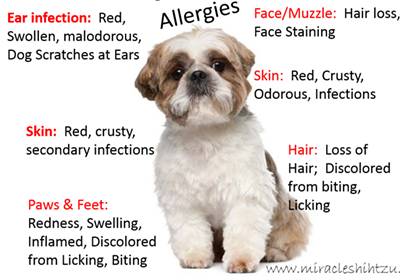 "Due to their anti-inflammatory
effects, I routinely use large doses of fatty acids when
treating atopic dermatitis in pets. Like most doctors, I recommend
2 to 4 times the label dose, as research in allergy treatment
indicates that the label dose on most products is too low to exert
an anti-inflammatory influence."
"Due to their anti-inflammatory
effects, I routinely use large doses of fatty acids when
treating atopic dermatitis in pets. Like most doctors, I recommend
2 to 4 times the label dose, as research in allergy treatment
indicates that the label dose on most products is too low to exert
an anti-inflammatory influence."
Maybe Rover's paws are constantly damp from being licked and
chewed. Or his scratching keeps you both up at night, even though
he doesn't have fleas. The culprit could be allergies. Allergic skin
disease, or atopic dermatitis, is an extremely common skin disorder
in dogs. It's probably the number one skin problem we treat in my
practice. Many of the affected dogs have not only primary atopic
dermatitis, but secondary problems like bacterial or yeast
infections as well. Dr. Blanco and other veterinarians believe that
excessive itching, biting and licking of the paws are triggered by vaccination.
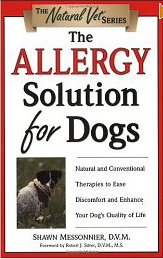 The conventional treatments have relied on corticosteroids and
antihistamines. While effective, corticosteroids have numerous side effects,
including increased thirst and urination, increased appetite,
weight gain, Cushing's disease, Addison's disease, osteoporosis,
increased susceptibility to infection, fatty liver disease,
diabetes mellitus, gastrointestinal ulceration, cartilage
degradation, and blood chemistry abnormalities. Side effects of
antihistamines are less common but include sedation and failure to
control the itching.
The conventional treatments have relied on corticosteroids and
antihistamines. While effective, corticosteroids have numerous side effects,
including increased thirst and urination, increased appetite,
weight gain, Cushing's disease, Addison's disease, osteoporosis,
increased susceptibility to infection, fatty liver disease,
diabetes mellitus, gastrointestinal ulceration, cartilage
degradation, and blood chemistry abnormalities. Side effects of
antihistamines are less common but include sedation and failure to
control the itching.
Complementary therapies are used to reduce or preferably
eliminate the need for chronic drug therapy, allowing relief from
the itching without the troubling side effects so often seen with
conventional treatments.
Arthur Young DVM, always advises his clients to add
glyconutrients to their pets diet.
Decades of consuming nutritionally questionable
commercial pet food products, the proven harmful effects of over
vaccination, combined with the unfortunate dependency on steroids
and antibiotics have, according to many reliable sources greatly contributed to a national decline in
animal health. The innate
ability of the body to heal itself has been seriously compromised
in many animals, particularly dogs, cats, and horses.
Glyconutrients are compatible with any type of treatment prescribed
by both conventional and alternative practitioners. These essential
carbohydrates strengthen the body’s inner environment which, in
turn, enhances the energy that stimulates the immune system, as
well as a process called “cell communicationâ€. This communication
network results in all of the organs working with one another in an
orderly sequence of body reactions. Without these activities, good
health is impossible to attain. Although the formulation is
produced for human consumption, holistic veterinarians have also
recognized the importance of glyconutrients in supporting the
handling of health challenges in animals. Credit goes to Gunter
Blobel, M.D., Ph.D. (Rockefeller University), winner of the 1999
Nobel Prize for Medicine "for the discovery that (glyco) proteins
have intrinsic signals that govern their transport and localization in the cell."


my Dog's Recovery From Flea Bites and Hot Spots
 In 1992, my 2 year old dog, Shasta,
was plagued with flea bites and hot spots (an area that is
inflamed, bleeding, oozing, and hairless.) She was not alone to
suffer miserably from itching and burning. Her doggie friends in
the neighborhood were suffering just as much.
In 1992, my 2 year old dog, Shasta,
was plagued with flea bites and hot spots (an area that is
inflamed, bleeding, oozing, and hairless.) She was not alone to
suffer miserably from itching and burning. Her doggie friends in
the neighborhood were suffering just as much.
I began doing research to try to help her and I learned that our
dog's and cat's skin problems are often vaccine induced. Many veterinarians believe
that vaccines are causing harms to our beloved pets, from skin allergies to
cancer and other chronic disease referred to as
"vaccinosis". Homeopathic veterinarians recommend a treatment with homeopathic remedies
to remove toxins and side effects of vaccines.
I decided to feed my dogs RAW food and to supplement their diet with flaxseed oil (linseed oil),
chia seeds, kelp and fulvic minerals
and/or marine phytoplankton (consist of an immense
arsenal and array of naturally occurring powerful phytochemicals,
biochemicals, supercharged antioxidants, free-radical scavengers,
super oxide dismutases, nutrients, enzymes, hormones, amino acids,
antibiotics, antivirals, and antifungals), and
bee pollen rich in naturally occurring vitamins.
I also treated them with homeopathic
remedies. I saw nice improvement in a matter of weeks.
If fleas begin to bother my dogs occasionally during the hot
summer time and they begin to bite or scratch herself, I give them
homeopathic remedies, and an immune support product which help boost their immune system, and offers her a
better resistance to flea attacks. The homeopathic remedies I use
are Pullex Irritans 6c and sulphur 30c. Occasionally
I also used Calcarea carbonica 30C or 200C.
I place a single pellet of the sulphur 30c in the water bowl ONE
TIME ONLY and I wait a few weeks to see the result. Sulfur is very
powerful and if used too much or too often can cause a
healing crisis. Depending on the
animal and the situation sometimes sulfur may not resolve the
problem. If they continue to have flea bites allergies, I add in
the water bowl one pellet of pullex once everyday for a week or
two. Usually those two remedies solve the problem. (pullex is the
Latin name for flea. It is a homeopathic remedy made from the flea
itself) Part 1: how I saved Shasta's
life

Natural Herbal Skin and Ear Products for Dogs
Fortunately you can purchase external treatment salves and
shampoos that contain tea tree oil and other soothing natural
ingredients.
-
 Herbal Ear Formula for Dogs and Cats - Effective blend
of therapeutic herbs and mild cleansers. Cleans ears, removes wax
and debris. Eliminates odor. Non-toxic.
Herbal Ear Formula for Dogs and Cats - Effective blend
of therapeutic herbs and mild cleansers. Cleans ears, removes wax
and debris. Eliminates odor. Non-toxic.
-
Herbal Skin and Coat Shampoo for Dogs and Cats Unique
self-adjusting contains just enough cleaning ingredients to balance
oily skin and ample nutrients to condition dry skin
- Soothing Mist for Dogs and Cats, Puppies and Kittens Formulated
for hot spots, irritated skin, sore skin, itchy skin, excessive
scratching, biting and more. Contains aloe vera gel, zinc, vitamin
C and other skin enhancing herbs.
- Herb Skin Poultice with Comfrey Leaf - Abscesses, Bed Sores,
Blood Poisoning, Breasts - Sore Nipples, Bruises, Burns, Chicken
Pox, Cuts, Disinfectant, Gangrene, Infection, Open Sores And
Ulcers, Swelling, Ulcers, Wounds.
- 100% safe, all natural and organic pest control products
- Vinegar for Flea Bites, ear inflammation
and other skin conditions
Avoid toxic Cleaning Products
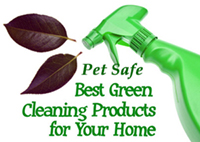 Hundreds of toxic chemicals are used common
household products. You may have safety latches on your kitchen
cabinets to protect young children from swallowing the cleansers.
Your pets may run on your freshly mopped floor and then lick their
paws.
Hundreds of toxic chemicals are used common
household products. You may have safety latches on your kitchen
cabinets to protect young children from swallowing the cleansers.
Your pets may run on your freshly mopped floor and then lick their
paws.
Natural living has reached the mainstream: we are now far more concerned about the air we breathe,
the water we drink, and the chemicals that surround us, and recognize that government regulations
all too often fall short of safeguarding our health.
Protecting Yourself and Your Family from Everyday Toxics and
Harmful Household Products in the Home Use safe products to replace harmful substances we are exposed to in
our own homes. Whether you suffer from unexplained headaches,
fatigue, or depression, or if you worry about the link between
increased use of toxics and the rising rate of cancer, the many
suggestions in this book can make your life virtually toxic-free!

Vinegar for Flea Bites and Skin Allergies
"Vinegar is a naturally occurring germ killer and is one of the
very first medicines known to man. It was used as a healing
dressing on wounds and infectious sores in Biblical times, and it
is credited with saving the lives of thousands of soldiers during
the Civil War. It was used routinely as a disinfectant on wounds.
It kills germs on contact and it contains bacteria which is
unfriendly to infectious micro-organisms. It is a natural remedy
and most of all, it is safe. Vinegar is particularly useful for
neutralizing alkali burns. And it relieves itchy skin too. We coat
the 'hot spots' with vinegar, full strength, using a cotton ball or
poured directly from the bottle. For a full body treatment, add
four cups of vinegar to the bath water. Be careful not to get the
vinegar/water mixture in the ears and eyes. The vinegar/water
rinses are a quick remedy to relieve minor skin irritations such as
hives, chigger bites, other insect bites and rashes." Carolyn Waller -
Note from Shirley: I have received a few testimonials
from people who use organic white or red vinegar internally and
externally for their animals, including horses, for flea bites and
other minor skin irritation such as hives, etc. I have never used
vinegar on or for my animals and cannot verify the validity of
these statements. If you decide to use vinegar, it is important to
only use only organic white or red vinegar because some
commercial vinegars are made from wood pulp. Here is one
testimonial:
"Animals need not suffer from flea bites at all. For years our
dogs suffered from flea bites.We washed them with flea shampoos,
powdered them with flea powders, bombed the house with aerosols,
flea collars, etc. A friend told us about a method his grandmother
used that was very effective. Take a gallon of water, add four to
six teaspoons of white vinegar to it, and give it to your pets as
their only drinking water. If they have a water dish outside, use
this water for that as well. During the winter ( Ohio) , I give
them four tsps.. during the summer ( flea season ) I give them six
tsps. We haven't seen a flea in over ten years. It works on any
animal. We have a dog ( seven years old ) that has never seen a
flea. All of these commercial flea preparations are bad for the
health of our pets. We had a dog living with us temporarily that
had lived in North Carolina for awhile, that was almost eaten alive
by fleas down there. We gave her vinegar water and all of her
problems disappeared. I live in the Cleveland Ohio area."
Ear Inflammation, Odor, Wax build up
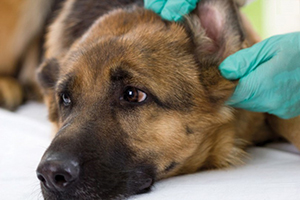 Warning! Dennis W. Thomas, DVM - "As a pet owner, it is
important to know that persistent or recurring ear pain infections in a
dog commonly are manifestations of other concurring disease
processes. Allergies and hypothyroidism are good examples. Systemic
allergies often cause dermatitis and itching in the ear canal,
which predispose self-trauma and subsequent ear infection.
Hypothyroidism may manifest itself as increased thickness of the
skin and continual release of exudate in the ear canal, which
favors an environment for otitis externa. It is not wise to use
cotton tip applicators in the ear canal. This can be quite painful
to the dog. Also, I don't recommend using alcohol in a dog's
ear. Alcohol will dry the ear, but if there is inflammation or
small scratches in the canal, the alcohol will burn and cause
tremendous pain and further inflammation. If you must use a
product from the shelf at home, use white vinegar diluted 50:50
with water.
Warning! Dennis W. Thomas, DVM - "As a pet owner, it is
important to know that persistent or recurring ear pain infections in a
dog commonly are manifestations of other concurring disease
processes. Allergies and hypothyroidism are good examples. Systemic
allergies often cause dermatitis and itching in the ear canal,
which predispose self-trauma and subsequent ear infection.
Hypothyroidism may manifest itself as increased thickness of the
skin and continual release of exudate in the ear canal, which
favors an environment for otitis externa. It is not wise to use
cotton tip applicators in the ear canal. This can be quite painful
to the dog. Also, I don't recommend using alcohol in a dog's
ear. Alcohol will dry the ear, but if there is inflammation or
small scratches in the canal, the alcohol will burn and cause
tremendous pain and further inflammation. If you must use a
product from the shelf at home, use white vinegar diluted 50:50
with water.